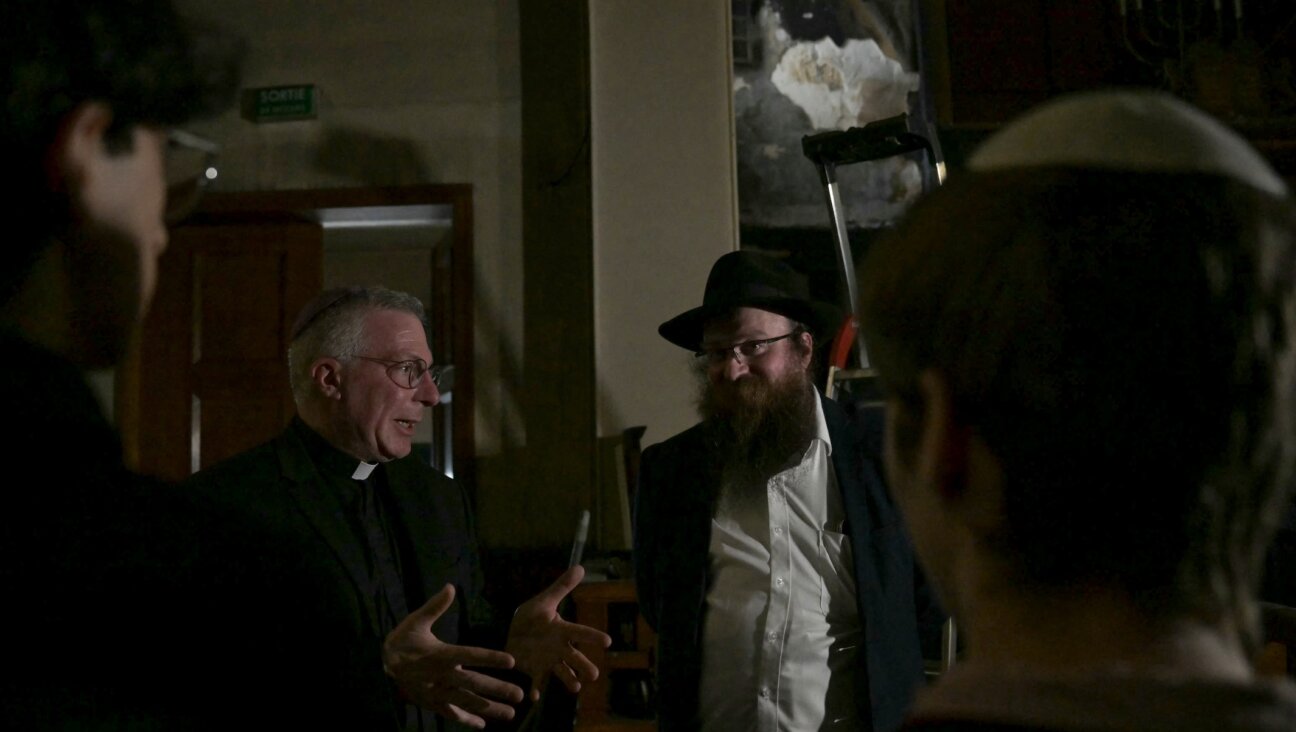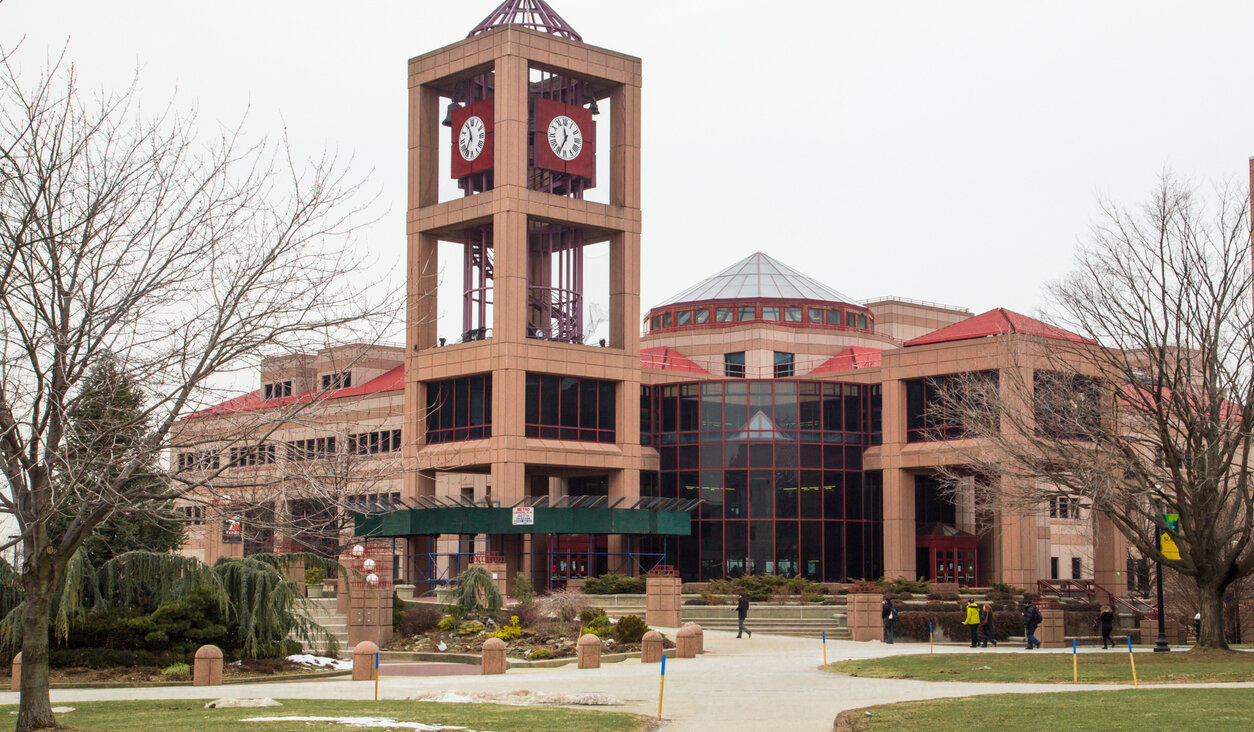Amid Nagorno-Karabakh conflict, Armenian synagogue defaced as local anger over Israeli arms sales to Azerbaijan grows

Red paint is seen on the front of the Mordechay Navi Jewish Religious Center in Yerevan, Armenia, Oct. 3, 2023. (Conference of European Rabbis)
(JTA) — Vandals threw red paint on an Armenian synagogue on Tuesday, in the latest sign of increasing tensions between Armenia and Israel as Israeli arms sales have fueled Azerbaijan’s offensive in the contested Nagorno-Karabakh region.
The paint was smeared on the Mordechay Navi Jewish Religious Center in Yerevan, what is thought to be the only synagogue in Armenia’s capital city. Most estimates put the number of Jews in Armenia at a few hundred.
The Conference of European Rabbis — an organization of Orthodox rabbis led by the exiled former chief rabbi of Moscow, Pinchas Goldschmidt — tied the act of vandalism to posts it shared from a nationalist Armenian group that had circulated on pro-Armenian social media pages at the time.
“The Jews are the enemies of the Armenian nation, complicit in Turkish crimes and the regime of Aliyev, stained with the blood of the Republic of Armenia and Artsakh,” one post read, referring to Azerbaijani President Ilham Aliyev.
“The Jewish state provides weapons to Aliyev’s criminal regime, and Jews from America and Europe actively support him,” the post continued, according to the Conference of European Rabbis. “If Jewish rabbis in the United States and Europe continue to support Aliyev’s regime, we will continue to burn their synagogues in other countries. Every rabbi will be a target for us. No Israeli Jew will feel safe in these countries.”
Despite that threat, the Armenian synagogue that was defaced was not burned on Tuesday, according to reports and photos from the scene.
Israel and Azerbaijan have developed close relations in recent years, as Azerbaijan provides Israel with approximately 40% of its oil resources. According to reports, Israel supplied up to 70% of Azerbaijan’s military arsenal in the years leading up to 2020. The Associated Press reported on Thursday that Azerbaijani cargo planes were seen leaving Israel last month.
Israeli officials have said that the arms relationship is partly due to Azerbaijan’s geographic proximity to Iran, a country that routinely calls for violence against Israel. “We have a strategic partnership to contain Iran,” Arkady Mil-man, Israel’s former ambassador to Azerbaijan, told the AP.
Over the past two weeks, more than 100,000 ethnic Armenians have fled Nagorno-Karabakh after Azerbaijani troops began fighting with Armenian rebels, reigniting of a conflict that flared in 2020 and left thousands of fighters dead. The region — which is part of Azerbaijan but has a population that is ethnically and culturally tied to Armenia — was the site of a war in the 1990s, after the dissolution of the Soviet Union.
Armenian officials have begun to express concern over Israel’s military support of Azerbaijan. “For us, it is a major concern that Israeli weapons have been firing at our people,” Armenian Ambassador to Israel Arman Akopian told the AP. “I don’t see why Israel should not be in the position to express at least some concern about the fate of people being expelled from their homeland.”
Azerbaijan has also striven to cultivate ties with global Jewish groups, including the Conference of European Rabbis, which is slated to hold a meeting in Baku in November. The Rabbinical Centre of Europe, a group of European rabbis associated with the Chabad-Lubavitch Hasidic movement, issued a statement last month condemning Armenian Prime Minister Nikol Pashinyan for using the word “genocide” to describe the Nagorno-Karabakh conflict. Pashinyan also told Agence-France Presse that Azerbaijani troops have created “a ghetto” in the disputed region.
“Senior Armenian government officials… employed the language and comparisons that are appropriate solely to describe the deliberate, systematic and largest genocide in the history of mankind, which the Jewish people have been subjected to: The Holocaust,” the statement read. “Such words as ‘ghetto,’ ‘genocide,’ ‘Holocaust’ and the like [are] in no uncertain terms inappropriate to be part of the jargon used in any kind of political disagreement. Usage of these terms belittles the terrible suffering experienced by the Holocaust victims and the entire Jewish people.”
This article originally appeared on JTA.org.

I hope you appreciated this article. Before you go, I’d like to ask you to please support the Forward’s award-winning, nonprofit journalism during this critical time.
Now more than ever, American Jews need independent news they can trust, with reporting driven by truth, not ideology. We serve you, not any ideological agenda.
At a time when other newsrooms are closing or cutting back, the Forward has removed its paywall and invested additional resources to report on the ground from Israel and around the U.S. on the impact of the war, rising antisemitism and the protests on college campuses.
Readers like you make it all possible. Support our work by becoming a Forward Member and connect with our journalism and your community.
Make a gift of any size and become a Forward member today. You’ll support our mission to tell the American Jewish story fully and fairly.
— Rachel Fishman Feddersen, Publisher and CEO
Join our mission to tell the Jewish story fully and fairly.




















